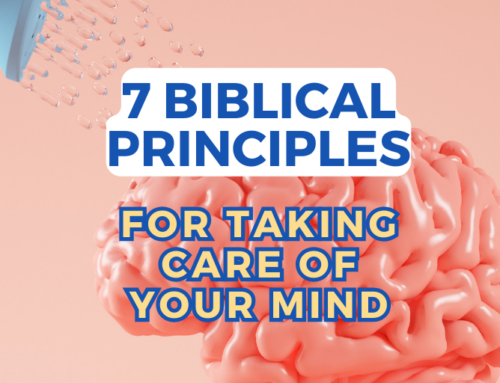A baby born after a loss is referred to as a “rainbow baby,” so we included this nod to our losses in my maternity photos. Photo credits: A.McGrath Photography
“Be joyful in hope, patient in affliction, faithful in prayer.” I have conflicting feelings about this verse (Romans 12:12), although it has been my favorite for as long as I can remember. For one thing, I fail at every part of it. On the other hand, it contains everything I need to survive even the depths of despair.
I’m Abigail, and I am many things—a friend of Tony’s, a lifelong Christian, an occupational therapist, a mother of three, a wife, and hopefully a future entrepreneur (you know, in my free time). I have also struggled with an anxiety disorder since high school and more recently added PTSD to the mix.
Quick background: I started having panic attacks in high school, but it took about 10 years of sleepless nights, shortness of breath, and perseverative, irrational thoughts for me to admit to myself that I have an anxiety disorder. The severity of my anxiety has varied over the years, with the highest peaks occurring during my five pregnancies — in no small part because two of those pregnancies ended in a loss. Generally, I manage my symptoms using Cognitive Behavioral Therapy techniques and talk therapy, as well as leaning on my supportive husband and a strong church community.
Pregnancy, childbirth, and caring for a newborn lend themselves to fear and anxiety. What if there’s something wrong with my baby? What if I can’t give birth the way I want to? What if I harm the baby? What if something goes wrong with my pregnancy? Every mother I’ve ever talked to asks herself at least some of these questions during her pregnancy, and the rollercoaster of hormones you ride along the way doesn’t help. After my first pregnancy loss, I found doctor appointments to be terrifying and saw pregnancy as something to “get through.” When we found out 18 weeks into my fourth pregnancy that we had again lost a baby, the voice of anxiety took over for a few months and jumbled my grief, fear, anger, and pain into what I now recognize as PTSD. While I now have three beautiful children and no plans to become pregnant again, I still have physical symptoms upon entering my doctor’s office, seeing someone else’s ultrasound picture, or receiving the news that a friend is pregnant. Sometimes with no trigger at all, I lie awake at night replaying the procedures I went through, the picture in my mind of ultrasounds that look all wrong, my body continuing to act pregnant long after I wasn’t, and so on. Interestingly, both the support that was crucial to me coming out the other side of that dark time and the thoughtlessness that hurt me the most came from the body of Christ.
I think the church has come a long way in its understanding of mental illness and empathy for members who live with some form of it, but stigma, secrecy, and shame can still surround the subject—perhaps even more in the case of motherhood. It has always seemed to me that most Christians don’t know how to act or what to say when church members openly speak about their mental health struggles, so they share some sort of quasi-scriptural platitude instead of attempting to see or even join us in our anguish. The same is true of pregnancy or infant loss; it’s a grief that is invisible and too complex for many to understand, and the gritty details can feel like too much to share when it’s not openly and lovingly received. It’s not that our Christian brothers and sisters want to minimize our symptoms or demean our struggle—in fact, they are generally trying to do the opposite. It’s a lack of understanding or, perhaps, a hesitancy to “meet us where we are” when where we are is dark and scary.
Recently my wonderful pastor was preaching a sermon in which he spoke about not being anxious in Christ, and he paused to distinguish between the anxiety everyone feels from time to time and having a clinically diagnosable anxiety disorder. That little pause may have gone right over most people’s heads, but that moment of validation spoke an important truth out loud: having a mental illness doesn’t make you a bad Christian. Dealing with symptoms of your illness is not the same as sin. Thoughts plaguing your mind of terrible things that could happen or have happened to you don’t necessarily mean you are doubting God. Sometimes prayer alone isn’t enough to successfully battle those thoughts. I believe God created his people with a diversity of important gifts, and I am especially thankful for those he gifted as counselors, clinical psychologists, and scientists responsible for medication. Talking confidently and unabashedly about my diagnoses, the treatments I have tried, and the symptoms I experience is something I started intentionally doing after I realized how freeing it was to do so in therapy, and as a result I have had many important and edifying conversations with other Christians—both those who struggle with their own issues and those wishing to support me without knowing how to. The more we can talk about mental health openly within the body of Christ, the better we can all become at serving and loving those struggling with mental illness or working through grief.








